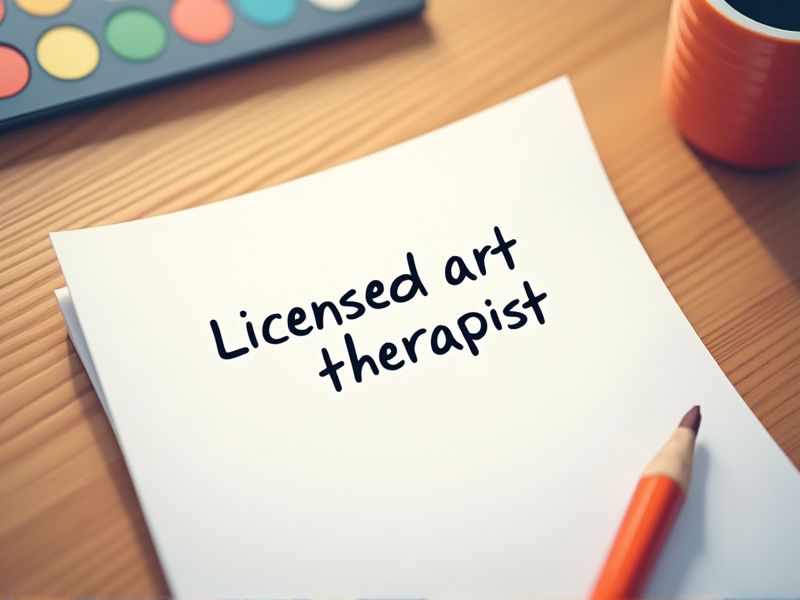
Licensed art therapists work at the intersection of mental health and creative arts, requiring a unique skill set. Accreditation ensures they possess the necessary therapeutic knowledge and artistic sensitivity critical for client care. Without specific certifications, professionals may lack essential competencies for effective therapy. Here are some vital certifications you might need as a licensed art therapist.
Registered Art Therapist (ATR)
The designation of Registered Art Therapist (ATR) ensures that an individual has completed specific educational and clinical training requirements, enhancing the credibility and competence of a licensed art therapist. This credential is a marker for employers and clients, instilling confidence in the therapist's ability to employ art-based interventions effectively. Without the ATR designation, it can be challenging to demonstrate a standardized level of proficiency and experience in the field. Additionally, ATR status often facilitates better networking opportunities and increases competitive advantage in the job market.
Board Certified Art Therapist (ATR-BC)
Board Certified Art Therapist (ATR-BC) status enhances credibility, showcasing an advanced level of expertise in the field. It ensures that the therapist meets rigorous professional standards, ensuring high-quality care for clients. The certification supports professional development and may improve career opportunities by attracting employers seeking specialized skills. Licensing may be legally required for practice, but board certification often elevates practice standards and client trust.
State Art Therapy Licensure
State Art Therapy Licensure establishes standardized qualifications, leading to increased trust and recognition of art therapists within the healthcare system. This licensure ensures that practitioners have met specific educational and ethical requirements, safeguarding clients' welfare. Without licensure, varying standards may exist, risking inconsistent care quality. Through licensing, art therapists gain access to broader job opportunities and insurance reimbursements, enhancing professional growth.
Certified Expressive Arts Therapist (CEAT)
Licensed art therapists may benefit from Certified Expressive Arts Therapists (CEAT) to broaden their therapeutic toolkit, as CEATs incorporate diverse artistic modalities like music, dance, and drama. This holistic approach can enhance the client's healing process by engaging multiple senses and pathways for expression. With the addition of expressive arts therapy, clients might experience a more personalized and adaptable treatment plan. CEAT offers specialized training that can empower art therapists to address varied client needs and foster deeper emotional and psychological understanding.
Licensed Professional Counselor (LPC)
Licensed art therapists often require the guidance of a Licensed Professional Counselor (LPC) to navigate complex client issues beyond the scope of art therapy. LPCs provide support in diagnosing mental health disorders, ensuring a comprehensive approach to treatment. Working with an LPC can enhance therapeutic outcomes by integrating traditional counseling techniques with creative art therapy methods. The collaboration ensures adherence to ethical guidelines and professional standards in mental health care.
Licensed Mental Health Counselor (LMHC)
Licensed art therapists often work with complex emotional and psychological issues, which a Licensed Mental Health Counselor (LMHC) can help address through comprehensive mental health expertise. The LMHC can provide diagnostic capabilities and therapeutic strategies that complement the creative approaches used in art therapy. The synergy between an LMHC and an art therapist broadens the therapeutic scope, enhancing treatment outcomes for clients. When art therapy sessions trigger intense emotional responses, the LMHC's skills in crisis intervention become critical for client stabilization.
Licensed Clinical Social Worker (LCSW)
An LCSW is needed for licensed art therapists because they provide clinical supervision, which ensures therapeutic practices adhere to ethical guidelines and high standards of care. Art therapists often deal with complex psychological issues; thus, an LCSW can offer valuable insights into clinical assessment and treatment planning. The collaboration enhances multidisciplinary approaches, allowing art therapists to integrate broader mental health strategies. Insurance reimbursement often requires clinical oversight by an LCSW, making their role crucial for the financial viability of art therapy services.
Certified Trauma Specialist (CTS)
Licensed art therapists benefit from Certified Trauma Specialist (CTS) certification as it equips them with advanced skills to address trauma-specific issues, enhancing therapeutic outcomes. Trauma-informed care is crucial, as many individuals seeking therapy have experienced some form of trauma, which can significantly impact their mental health. With CTS training, therapists can design interventions that are both creative and targeted, increasing client engagement and effectiveness. Evidence supports that trauma-informed practices lead to better client resilience and recovery rates, making CTS an invaluable addition to an art therapist's credentials.
Certified Anxiety Treatment Professional (CATP)
Licensed art therapists might benefit from becoming Certified Anxiety Treatment Professionals (CATP) as it allows them to specialize in treating anxiety, a common co-occurring condition among their clients. Specializing in anxiety treatment enhances their therapeutic repertoire, enabling them to address specific client needs more effectively. The CATP credential signifies a higher level of expertise, which may attract more clients seeking targeted therapy for anxiety. Holding the certification potentially increases a therapist's credibility and can lead to improved outcomes for clients experiencing anxiety-related issues.
Certified Creative Arts Facilitator (CCAF)
Engaging a Certified Creative Arts Facilitator (CCAF) enhances a licensed art therapist's practice by integrating structured creative techniques, which can lead to improved therapeutic outcomes. The CCAF credential provides specialized training that equips therapists to better address diverse client needs through tailored artistic interventions. Including a CCAF in therapy sessions fosters a deeper exploration of emotions and self-expression, complementing the art therapist's clinically grounded methods. Incorporating this certification may increase client engagement and retention, as it expands the range of therapeutic activities available.
Summary
When you, as a licensed art therapist, earn additional certifications, you enhance your professional credibility. This added expertise can increase your appeal to potential employers, leading to better job opportunities. These certifications often expand your skill set, enabling you to offer a broader range of therapeutic interventions. As a result, you might also see increased client satisfaction and improved therapy outcomes, reflecting your advanced capabilities.
